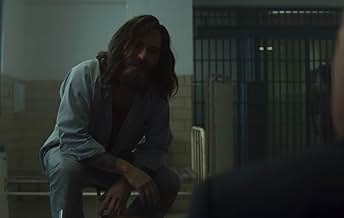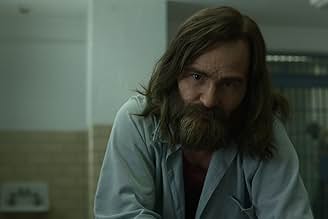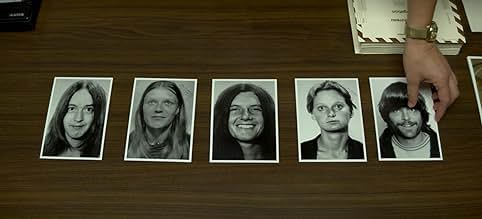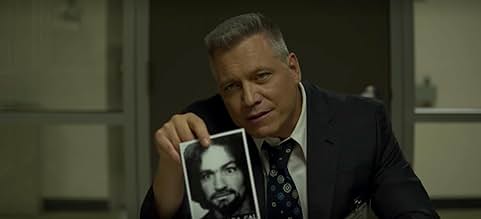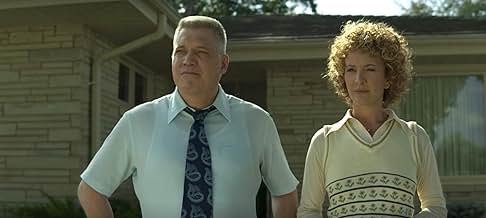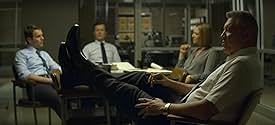Bill's devastating family situation spills over during his interview with Holden's holy-grail subject: Charlie Manson. Wendy's new romance heats up.Bill's devastating family situation spills over during his interview with Holden's holy-grail subject: Charlie Manson. Wendy's new romance heats up.Bill's devastating family situation spills over during his interview with Holden's holy-grail subject: Charlie Manson. Wendy's new romance heats up.
- CMF Guard #2
- (as Eli Everett)
Featured reviews
Clearly people were asked who was your favourite character? And so this season Bill Tench is the main character. That's not really a problem but without Holden to contrast and balance him out he doesn't seem as interesting.
The show was hugely interesting because it was exploring the extremes of humanity and we could see its effects on the 'normal' characters. Now it's more about the characters (who just happen to interview criminals). In shifting focus has become just like very other character drama show. It's lost its point of distinction and become less interesting.
The carefully researched attention to details are also getting less and less attention - Someone makes a point of being called 'Ms' without characters reacting to how uncommon that was at the time. Screw top wine bottles are mentioned like they were commonly in use at the time. Computers appear that haven't even been made yet (TRS-80 Model 4). Get ready for more obvious product placement too.
It's symptomatic of the changes in the whole show. The decline is subtle enough that it's not become unwatchable, it's just much less enjoyable. What was once one of the more interesting shows to watch is now heading more toward something you put on in the background. The interviews with criminals are still interesting, but that's about it.
Holden is the poster boy autistic genius, a serial killer groupie who wets his pants every time he interviews a "celebrity" and who's totally unaware of anything going on around him.
Bill is actually a sympathetic character, but his home issues are just too freakish to be believable and seem just a convenient plot device created to build the explosive Manson scene.
Dr. Carr is the thinking woman sex symbol. Cool, calm, collected, always perfectly groomed, smart and gay! Basically Netflix ideal superwoman. As such, not a particularly endearing character.
The Atlanta story is also ideal Netflix territory, so we're sliding back into predictable grounds very fast.
The episode opens with Bill Tench (Holt McCallany) grappling with the fallout from a tragic event involving his adopted son Brian, whose involvement in a disturbing incident shakes the family to its core. The portrayal of Bill's emotional turmoil is nuanced and deeply affecting, highlighting the personal cost of working in a profession constantly exposed to humanity's darkest facets. Nancy Tench (Stacey Roca) and Brian's interactions add layers of complexity, illustrating the challenges of communication and understanding within a family marked by trauma and silence.
Parallel to the Tench family drama, Holden Ford (Jonathan Groff) and Bill embark on a high-stakes interview with Charles Manson (Damon Herriman) and Tex Watson (Christopher Backus). The scenes featuring Manson are particularly gripping, capturing his charismatic yet menacing presence. The episode explores the dynamics of cult leadership and manipulation, with the BSU agents attempting to unravel the psychological mechanisms that allowed Manson to exert such control over his followers. The dialogue is sharp and revealing, providing insight into the nature of power, belief, and violence.
Wendy Carr (Anna Torv) experiences a moment of personal respite and connection, as her burgeoning romance with Kay (Lauren Glazier) offers a contrast to the grimness of her professional life. This subplot adds emotional depth and humanizes Wendy, showcasing the series' commitment to nuanced character development beyond the procedural framework.
Dominik's direction is marked by a careful balance of tension and intimacy. The cinematography employs a muted color palette and precise framing that evoke the oppressive atmosphere of the era and the psychological weight of the subject matter. The editing maintains a deliberate pace, allowing scenes to unfold with emotional resonance while sustaining narrative momentum. The sound design subtly amplifies the unease and intensity permeating the episode.
Thematically, "Episode 2.5" delves into the complexities of trauma, control, and the human capacity for both cruelty and resilience. It interrogates the psychological underpinnings of cult behavior and the devastating ripple effects of violence on families and communities. The episode also reflects on the personal sacrifices demanded by the pursuit of justice and understanding, emphasizing the fragile boundaries between professional duty and personal vulnerability.
Within the broader context of Mindhunter, this episode reinforces the series' commitment to blending factual crime history with psychological insight and character-driven drama. Its nuanced portrayal of the Manson Family murders situates the narrative within a significant and troubling chapter of American history, adding depth and urgency to the season's overarching investigation.
"Episode 2.5" has been praised for its compelling performances, especially by McCallany, Groff, Herriman, and Torv, as well as Dominik's assured direction. Reviewers highlight its atmospheric tension, thematic depth, and the effective integration of personal and professional storylines. Some critiques note the episode's slow pacing compared to conventional crime dramas, but most agree it is a compelling and thoughtful continuation of the series' exploration of darkness and humanity.
"Episode 2.5" stands as a masterful and emotionally resonant chapter in Mindhunter's second season. Through meticulous craftsmanship, layered storytelling, and powerful performances, it challenges viewers to grapple with the complexities of cult dynamics, familial trauma, and the psychological costs of confronting evil. The episode not only advances the season's narrative but also deepens the series' meditation on the fragile boundaries between knowledge, empathy, and moral ambiguity, leaving a lasting impression as the story unfolds toward its climax.
Did you know
- TriviaDamon Herriman, who plays Charles Manson, also plays Manson in Once Upon a Time... in Hollywood (2019).
- GoofsWhen Bill arrives at SFO to catch a flight back to Washington he goes up to the Braniff International counter and is told he's missed his flight and has to take the red-eye. Braniff International never flew the route San Francisco to Dulles.
- Quotes
Charles Manson: But prison's a frame of thought. We're all our own prisons, we are each our own wardens, we do our own time. Prison is in your mind. Can't you see i'm free?
Bill Tench: You don't look so free to me, Charlie.
Charles Manson: You don't look free to me! You look like the composite of what someone told you are.
- ConnectionsReferences La Cage aux Folles (1978)
Details
- Release date
- Country of origin
- Official sites
- Language
- Filming locations
- Monroeville Mall - Business Route 22, Monroeville, Pennsylvania, USA(San Francisco International Airport)
- Production companies
- See more company credits at IMDbPro
- Runtime
- 1h 11m(71 min)
- Color
- Aspect ratio
- 2.20 : 1

